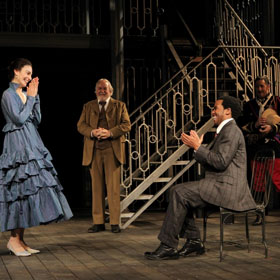Shakespeare in the Park: All's Well That Ends Well

4/5
If New York winter is defined by the crisp falling snow and the slow-shuffle pilgrimage of shivering huddled masses to the Christmas tree outside Rockefeller Center, then summer is defined by images of Central Park as an endless green shore of beach towels and picnic blankets, and of course, Shakespeare in the Park.
It’s a testament to the enduring appeal of this annual tradition that The Public Theater can stage second, or, in this case, third tier offerings from The Bard and still have people lining up for tickets each day for five or six hours at a time. In recent years productions have featured heavyweight thespians, the likes of Al Pacino and Meryl Streep, but this year the cast list contains no such A-lister. Not to say that the level of entertainment is diminished, far from it.
Built in the style of the round theaters of Ancient Greece, The Delacorte offers a singularly unique audience experience as performances typically begin at twilight and conclude under a blanket of stars. The open air seating arrangement offers favorable acoustics and no vantage points are obscured. Yes, the staff can be somewhat belligerent in their enforcement of the “no photography” rule, but they also won’t bat an eyelid if you decide to bring a whole loaf, a pack of butter, and an entire cheese platter to nibble on (as the people in front of us inexplicably did).
With Alls Well That Ends Well the cast and director have on their hands one of Shakespeare’s “problem plays,” so-called because they do not comfortably fit the definition of either tragedy or comedy. For our part, we’re not really sure where the argument is, as aside from the philandering Count Bertram being railroaded into marrying a young lady he feels beneath him by the one person who can get away with doing it (the King of France) there is no real tragedy here.
Alls Well that Ends Well, however, stands apart from many of The Bard’s comedies in that this one is actually funny. A casual blend of farce, screwball comedy, and the 17th Century English equivalent of dick jokes, the typically convoluted story mines the battle of the sexes for laughs in a way that matches anything Judd Apatow has got going on these days. “Tis surely a withered pear, my dear” one character remarks to Helena of her prolonged virginity.
If anything, the lack of bonafide star power in the ensemble this season likely helps matters, as so often when said star is off-stage the audience simply tunes out until they reemerge. This way the characters get to flourish a little more, and while some of their motivations could be construed as weak (Count Bertram, to name but one), in the sniveling, pratfalling Perolles they have one of Shakeaspeare’s great buffoons, almost worth standing in line for by himself.
RELATED ARTICLES
Get the most-revealing celebrity conversations with the uInterview podcast!





Leave a comment